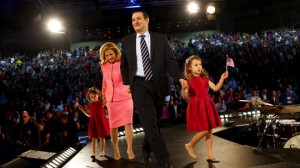Ted Cruz Becomes First Major Candidate to Announce Presidential Bid for 2016
< < Go Back
By NICK CORASANITI and PATRICK HEALY,
Senator Ted Cruz of Texas announced on Monday morning that he would run for president in 2016, becoming the first Republican candidate to declare himself officially in the race.
Linking the determination of his immigrant father with the resolve of the founding fathers and his own faith in “the promise of America,” Mr. Cruz spoke at length about his family and his faith as he laid out a case for his candidacy.
“God’s blessing has been on America from the very beginning of this nation, and I believe God isn’t done with America yet,” Mr. Cruz said before thousands of cheering students here at Liberty University. “I believe in you. I believe in the power of millions of courageous conservatives rising up to re-ignite the promise of America.”
“Today, I am announcing that I am running for president of the United States,” Mr. Cruz added. “It is a time for truth, it is a time for liberty, it is a time to reclaim the Constitution of the United States.”
Mr. Cruz, a first-term senator, is seen by Republicans and Democrats as a divisive figure in Washington, but as a truth-telling hero to many conservatives and evangelical Americans.
His speech was packed with calls to “imagine a president” who would repeal the Affordable Care Act, abolish the Internal Revenue Service, “defend the sanctity of human life and uphold the sacrament of marriage.”
With his two daughters and wife, Heidi, in attendance, Mr. Cruz opened his speech by providing a biography not of himself, but of his parents, and describing his connection to his faith.
Several Republicans said on Monday that given Mr. Cruz’s rhetorical skills and passion, and his ability to inspire restless or disenchanted conservatives and evangelical Americans, his candidacy should not be underestimated.
Continue reading the main story Continue reading the main story
Continue reading the main story
“He has had the single best sound bite over the last three years, saying that the big problem in Washington is we don’t listen,” said Frank Luntz, a longtime Republican pollster. “That message transcends ideology and partisanship, because so many in the public think Washington is out of touch.”
Mr. Cruz’s chief downside, Mr. Luntz said, is reflected in his relationships with other Republicans in the Senate.
“His colleagues really don’t like him, and it’s very difficult when your own colleagues won’t stand up for you,” Mr. Luntz said. “There’s a subtle message that there is something wrong.”
Mr. Cruz’s early entry into the race, according to people briefed on his strategy, is a deliberate effort to recapture the attention of his party’s right wing as he seeks to build a coalition of Tea Party conservatives and evangelical Christians to try to cut through a crowded field of Republican contenders.
In part, financial urgency prompted the accelerated timetable: advisers to Mr. Cruz have seen donors of the party flock to other potential candidates, including Gov. Scott Walker of Wisconsin, who since January has won the most notice among Republicans clamoring for a nominee other than former Gov. Jeb Bush of Florida.
Notably, however, Mr. Cruz has also begun championing a message of economic populism, denouncing income inequality and borrowing the “two Americas” metaphor used most famously by former Senator John Edwards in two unsuccessful campaigns for the Democratic presidential nomination.
Notably, however, Mr. Cruz has also begun championing a message of economic populism, denouncing income inequality and borrowing the “two Americas” metaphor used most famously by former Senator John Edwards in two unsuccessful campaigns for the Democratic presidential nomination.
Mr. Cruz’s tenure in Washington has been marked by accusations of demagogy. He sometimes deploys the soaring diction of a preacher while staking out uncompromising and rigid conservative positions, often playing the role of political flamethrower.
He championed the government shutdown of 2013, infuriating many in his party, and some, like Representative Peter T. King of New York, accused him of bringing the country “to the edge of ruin.” Mr. Cruz, however, stood firm, saying that he was elected to shake up the status quo in Washington, and that he was doing just that.
More From The New York Times:




